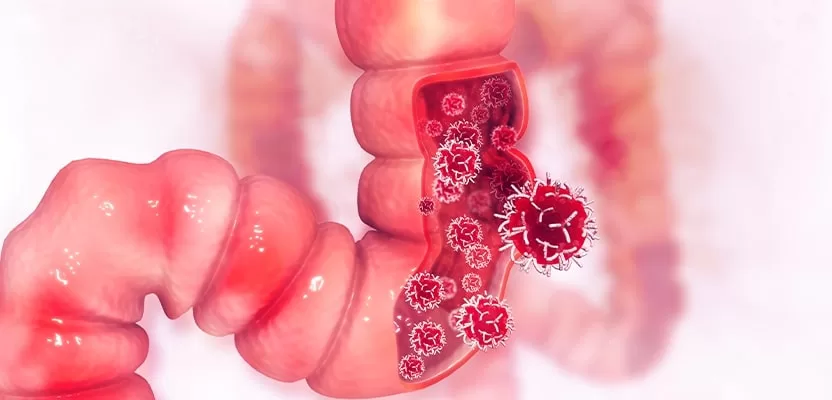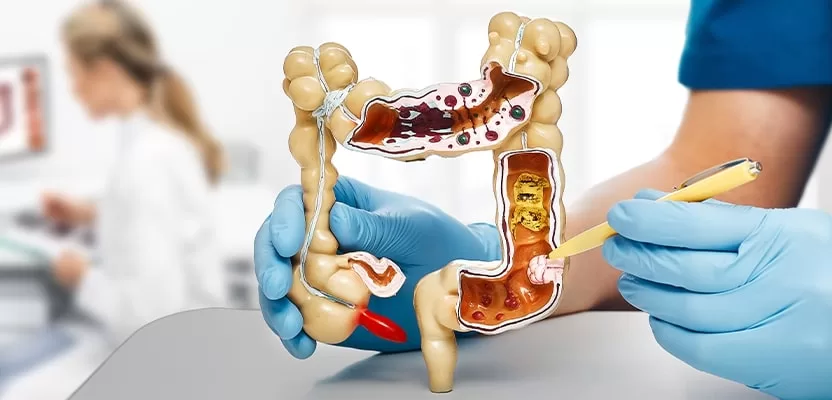+90 533 813 89 77
info@bookingforhealth.com
What is Colon Cancer Disease?
The colon and rectum are part of the body’s digestive system. They help process waste products so they can be eliminated from the body. Cancer that begins in the colon can spread to other parts of the body, including the liver and lungs.
Colon cancer, also known as colorectal cancer, is a type of cancer that begins in the colon or rectum, which are parts of the large intestine. These cancers can also be referred to as colon cancer or rectal cancer, depending on where they originate.
Most cases occur in people over the age of 50. However, if there is a family history of colon cancer or some inherited genetic condition, the individual if there is a medical history of inflammatory bowel disease, the risk of colon cancer is greater.
Low levels of physical activity, obesity, and excessive smoking are also among the other factors that increase the risk of colon cancer. It is extremely important to detect colon cancer early through regular screenings and tests to increase the chances of successful treatment.

What are the Symptoms of Colon Cancer?
The symptoms of colon cancer can vary from person to person. Some common symptoms of colon cancer include; diarrhea, a change in bowel habits such as constipation or a change in the consistency of stool lasting more than a few days, rectal bleeding or persistent abdominal discomforts such as blood, cramps, gas, or pain observed in the stool, a feeling of bloating felt even in the form of light nutrition, weakness or fatigue, unexpected weight loss, nausea or vomiting may be indicated.
It is extremely important to remember that these symptoms can also be caused by conditions other than colon cancer, such as irritable bowel syndrome, hemorrhoids, or stomach viruses. That’s why it’s important to see a doctor if you have any of these symptoms, especially if they persist or worsen over time.
Additionally, some groups of people are at increased risk for colon cancer, such as individuals over the age of 50 or those with a family history of colon cancer. For these individuals, colon cancer screenings are recommended to detect the disease in its early stages.

How Colon Cancer is Treated?
Colon cancer is typically treated with a combination of surgery, chemotherapy, and radiation therapy. The specific treatment plan will depend on the stage of cancer and the overall health of the patient.
Surgery is typically the first line of treatment for colon cancer and is usually used to remove the tumor and a portion of the surrounding healthy tissue, known as a margin. A variety of surgical procedures may be preferred to treat colon cancer. Colectomy, which involves removing the tumor and a small amount of surrounding tissue, removing the tumor and part of the colon or rectum, or removing the entire colon, are among these procedures.
Chemotherapy and radiation therapy may be used before or after surgery to kill any remaining cancer cells. These treatments can also be used in cases where surgery is not possible or cancer has spread to other parts of the body.
Other treatments like targeted therapy and immunotherapy may be used for those with specific genetic mutations or along with other treatments. The choice of treatment will depend on several factors, including the stage and grade of the tumor, the patient’s overall health and preferences, and the availability of clinical trials. Patients with colon cancer will also need close monitoring, a follow-up care plan, and lifestyle changes.
How is the Recovery Process of Colon Cancer Treatment?
The recovery process after treatment for colon cancer can vary depending on the type of treatment received and the stage of the cancer. Surgery is a common treatment for colon cancer, and recovery after surgery can take several weeks to a few months. People who have had surgery may experience pain and discomfort in the area where the surgery was performed, and may also have some difficulty with bowel movements.
It is important to note that every person has a different recovery process, some might have different side effects, and recovery time can vary as well, but with proper care, monitoring and support, it will be easier for a patient to go through the process.
After the treatment, it’s important to follow the recommendations of your healthcare team, including getting enough rest, eating a healthy diet, and getting regular exercise. In addition, you may need to have regular follow-up appointments with your healthcare provider to check for any signs of cancer recurrence.